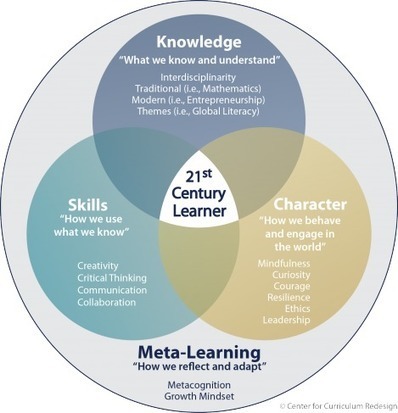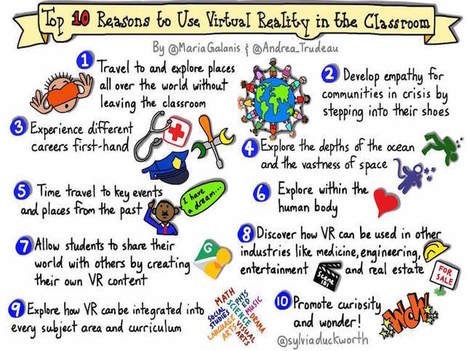 Your new post is loading...
 Your new post is loading...
Many have addressed how present and future students should learn. Few have examined what students should learn for the 21st century. The rapid increase in the rate of systemic change around the globe creates an increasingly volatile, uncertain, complex, ambiguous world and thus is significantly more unpredictable. Six emerging trends will require a diverse set of individual abilities and competencies and an increased collaboration among cultures.
Via Edumorfosis, juandoming, Ivon Prefontaine, PhD, Dean J. Fusto
Should your driverless car value your life over a pedestrian's? Should your Fitbit activity be used against you in a court case? Should we allow drones to become the new paparazzi? Can one patent a human gene?
Scientists are already struggling with such dilemmas. As we enter the new machine age, we need a new set of codified morals to become the global norm. We should put as much emphasis on ethics as we put on fashionable terms like disruption.
This is starting to happen. Last year, America's Carnegie Mellon University announced a new centre studying the Ethics of Artificial Intelligence; under President Obama, the White House published a paper on the same topic; and tech giants including Facebook and Google have announced a partnership to draw up an ethical framework for AI. Both the risks and the opportunities are vast: Stephen Hawking, Elon Musk and other experts signed an open letter calling for efforts to ensure AI is beneficial to society:
"The potential benefits are huge, since everything that civilization has to offer is a product of human intelligence; we cannot predict what we might achieve when this intelligence is magnified by the tools AI may provide, but the eradication of disease and poverty are not unfathomable. Because of the great potential of AI, it is important to research how to reap its benefits while avoiding potential pitfalls.
Via Ivon Prefontaine, PhD
"Proponents of using technology in classrooms argue that graphing calculators, particularly those equipped with programs that can compute algebraic symbols, would reduce the need for students to memorize formulas and perform time-consuming computations. But Wilson fears that students who depend on technology will fail to understand the importance of mathematical algorithms."
Via Ivon Prefontaine, PhD
(This is something that I have been thinking/reading/talking about for a while now & is the likely start of my journey into beginning a Masters degree.) Governments are throwing money at Innovation initiatives ($405 million in Queensland). Big Business are constructing innovation labs in their offices to promote innovative startup thinking from their employees. What is…
Via Ivon Prefontaine, PhD
Lucy Clark and John Marsden discuss why the Australian education system needs reform. Photo: SCU/Kaleb Smith Most of us probably remember, however vaguely, what it was like to be in school. There’s this sense of the collective school experience, where everyone knows what it’s like to be patronized, to feel disconnected with a system that…
Via Ivon Prefontaine, PhD, Dean J. Fusto
|
Sleep deprivation in teenagers as a result of early school start has been a topic of much debate. Are teenagers just lazy, or is there more to their inability to wake up early?
Via Peter Mellow, Ivon Prefontaine, PhD, Dean J. Fusto
Although still an emerging technology in terms of recognizing its full potential, virtual reality offers the opportunity to step into places, roles, and experiences that were previously impossible, or at the very least, inaccessible to most.
As Terry Heick said in Why Virtual Reality is So Important, “Through the use of digital technology, virtual realities can be designed precisely for human interaction for very specific reasons to create experiences not otherwise possible.
By suspending disbelief the same way we do when we read a novel or watch a movie, an artificial reality can be designed to enable experiential learning, scenario-based learning, social learning, workplace training, and more. Virtual reality can be used for pure entertainment–digital toys, video games, or to swim with whales.”
Sylvia Duckworth, sketchnoter extraordinaire, put together a graphic of ideas from Maria Galanis and Andrea Trudeau on Top 10 Reasons To Use Virtual Reality In The Classroom to help bring the world (and beyond) to your students with technology.
Via Edumorfosis, Suvi Salo, Ivon Prefontaine, PhD
Deflection behavior is when the narcissist blames the victim for their bad behavior and feels justified in bullying them. A malignant narcissist will even go as far as using the victim's own self defense against them. For example, posting a maliciously mean song about the victim and even using the victim's name in the title.…
Via Ivon Prefontaine, PhD
Society is changing in this era of global digital networks. Messages get around the world in minutes. As a result we are more connected to our fellow humans. We talk with people in every part of the world. Young people identify with other young people. Global social movements can quickly appear, and also disappear. Markets and institutions are being replaced by platforms in banking, lodging, transportation, and a growing number of fields.
The platform economy is also a rental economy, where little is owned and the platform capitalists control the rules [Just ask someone who has had their identity taken on Facebook]. As a result of this connectivity, people can identify with those like themselves. Seb Paquet called this “ridiculously easy group-forming”. However, the tendency to tribalism can be strong, and many of us are not prepared for this ‘change in the human condition’. The reversal of the positive aspects of a globally connected world is seeing everything as binary and dealing with complexity like a reality television show. This seems to be the tendency for many people, aided by the (still) market-oriented mass media. The possibility of Canada’s public broadcaster CBC to eliminate advertising may be a step in the right direction to counter this potential McLuhnesque reversal.
Via Edumorfosis, Ivon Prefontaine, PhD
NOTE: This post was originally published on the TN Department of Education's Classroom Chronicles. As we arrange our classrooms, finalize lesson plans, and reluctantly re-set our alarms in preparation for another school year, I wanted to offer advice to teachers who are hoping to instill a love of reading in all of their students, whether they’re…
Via Bookmarking Librarian, Ivon Prefontaine, PhD, Dean J. Fusto
|



 Your new post is loading...
Your new post is loading...


















